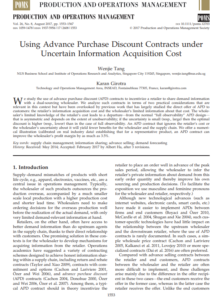We study the use of advance purchase discount (APD) contracts to incentivize a retailer to share demand information with a dual‐sourcing wholesaler. We analyze such contracts in terms of two practical considerations that are relevant in this context but have been overlooked by previous work that has largely studied the direct offer of APD to customers: the retailer’s information acquisition cost and the wholesaler’s limited information about that cost. The wholesaler’s limited knowledge of the retailer’s cost leads to a departure—from the normal “full observability” APD design—that is asymmetric and depends on the extent of unobservability; if the uncertainty is small (resp., large) then the optimal discount is higher (resp., lower) than in the case of full observability. An APD contract that ignores the retailer’s cost or the wholesaler’s uncertainty about it will yield fewer benefits for the wholesaler and the supply chain. We offer a numerical illustration (calibrated on real industry data) establishing that for a representative product, an APD contract can improve the wholesaler’s profit margin by as much as 3.5%.


